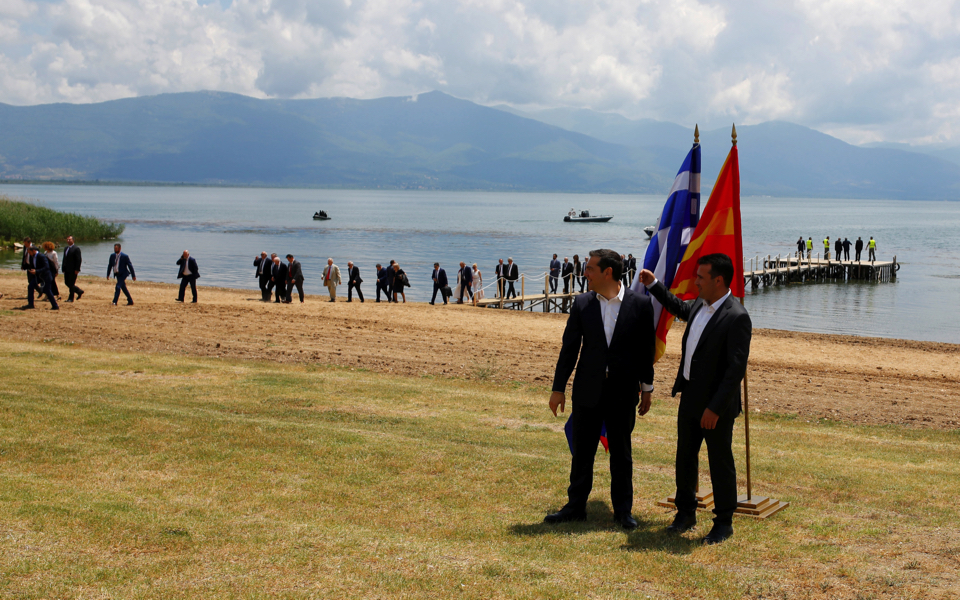Yes to North Macedonia

After more than 25 years, Athens and Skopje have reached a historic compromise on the name dispute between the two countries. The agreement implies substantial concessions and multiple benefits for both.
In the case of Greece, the mutually agreed name North Macedonia, to be used for all purposes, erga omnes (Article 1, Paragraph 8), is the best solution that could have been achieved. This is especially so as Greece’s request for FYROM to use the Slavic equivalent, “Severna Makedonija,” untranslated for international usage, did not succeed.
North Macedonia is a simple and short name. Combined with the fact that the rest of the world is familiar with such a geographical qualifier (e.g. South Africa, East Timor, South/North Korea, etc), this suggests that the new name stands a very good chance of prevailing in every day usage against the existing constitutional name of Former Yugoslav Republic of Macedonia.
In this way, Greece may succeed in changing the present status quo established over the past few decades, in which virtually all countries around the world have recognized – either officially or unofficially – Greece’s northern neighbor as the “Republic of Macedonia,” while ordinary people refer to the former Yugoslav republic as “Macedonia” at every opportunity.
In addition, the new name is distinctive in that it makes absolutely clear that one refers to a country whose territory comprises only a northern part of the wider geographical area of Macedonia. This allows the Greek Macedonian identity and rich cultural heritage to assert itself.
None of the remaining four proposals put forward by UN mediator Matthew Nimitz combines the above characteristics. For example, the qualifying term “Upper” in “Upper Macedonia” lacks widespread use internationally. Also, a chronological qualifier, such as the one in “New Macedonia” was problematic in the first place because it does not automatically imply the concurrent existence of another region that shares a similar name – the Greek region of Macedonia.
Positive aspects of the agreement include certain constitutional amendments by FYROM to eliminate references that could constitute a basis for interference and irredentism (Article 4, Para. 3), as well as the provision that FYROM shall not use again in any way and form the ancient Greek symbol known as the Sun of Vergina, which was formerly displayed on its national flag (Article 8, Paragraph 3).
On the other hand, negative aspects of the agreement foremost include the recognition of a “Macedonian” nationality and language, even if this comes with an explanation that the term “Macedonian,” when used as an ethnic term of Slavic people within FYROM, is completely unrelated to the ancient Greek Macedonia and the cultural heritage of Greece (Article 7).
This development has understandably caused a lot of frustration among the Greek people.
The present compromise with FYROM, while making concessions on issues relating to ethnicity and language, is going to improve substantially the existing international status quo vis-a-vis Greece, as this has been established over the past few decades.
The only hypothetical question that remains to be answered is whether Greece could achieve a better deal in the future, if the present one is not ratified by either party.
Considering the public outrage sparked in FYROM following the announcement of the agreement, I believe that such scenario is highly unlikely. For example, President Gjorge Ivanov, as well as the main opposition party and a significant portion of FYROM’s people, have accused their government of high treason. Letting another decade or two go by without reaching a compromise on the name dispute, will encourage “Macedonian nationalism” even further. This is going make the prospects of ever reaching some agreement between the two countries bleak. In the meantime, the rest of the world will continue referring to our neighbours simply as “Macedonia.”
Opposing the deal may be the least risky and seemingly more “patriotic” stance that political parties and community leaders could adopt. However, if they are truly committed to serving our nation’s best interests, now is the perfect time to ignore the temptation to make decisions influenced by short-term political and/or private gains.
Vasilis Sarafidis is a member of the executive board of the Australian Institute of Macedonian Studies.





